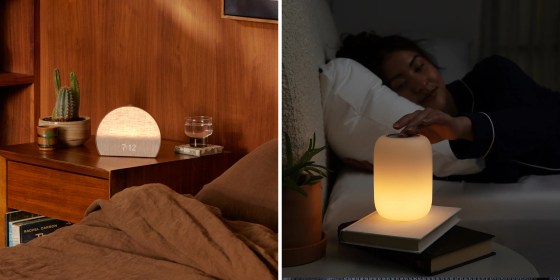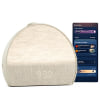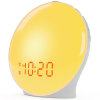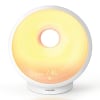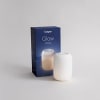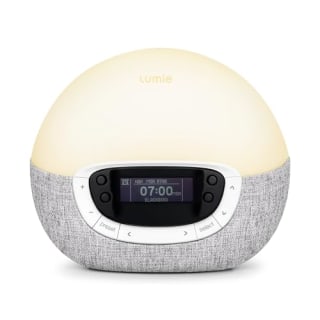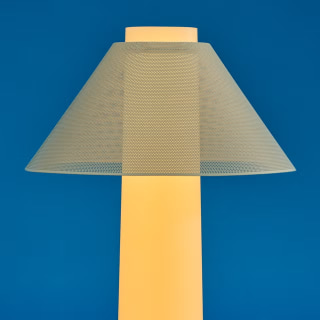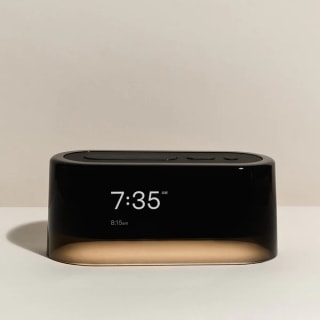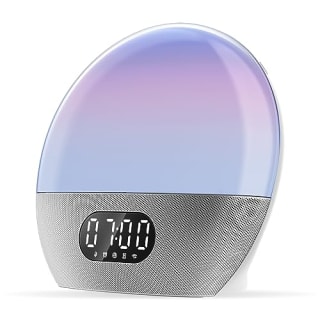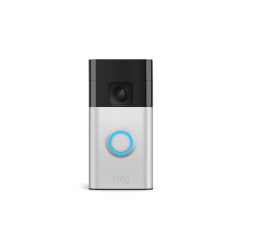If you start your day before the sun rises, or if you’re looking for a more peaceful alternative to a blaring alarm clock, a sunrise clock may be your new favorite nightstand accessory. They mimic the natural sunrise by gradually lighting up at a certain time, and many even have gentle sounds to help you wake up. Best of all, they won’t jolt you awake like a normal alarm clock would.
“Sunlight plays an essential role in the regulation of our sleep-wake cycles, also known as our circadian rhythm,” says Dr. Shelby Harris, a licensed clinical psychologist and the director of NY Sleep and Psychology. This can ultimately improve your overall sleep quality, mood and health, and using an alarm clock that simulates both the sunset and sunrise can even help you fall asleep faster and wake up quicker in the morning.
If you’re looking to make the switch, I consulted sleep experts on the benefits of sunrise alarm clocks and what to look for when shopping for one.
How I picked the best sunrise alarm clocks
To determine which sunrise alarm clock is best for you, our experts recommend keeping the following key features in mind (more on these features below):
- Adjustable brightness and colors: Look for a sunrise clock that lets you adjust its brightness level and color options, whether via an app or manually on the device, for a more customizable wake-up and wind-down experience, experts say. Most sunrise clocks will also automatically adjust the light in the morning to mimic the gradual sunrise.
- Brightness level: You’ll sometimes see a sunrise clock’s brightness level expressed in lux or lumens: Lumens are a measure of brightness, whereas lux is a measure of lumens spread over an area, expressed in square meters. As you shop for a sunrise alarm clock, keep in mind that a higher lux signifies a more intense light. Most sunrise clocks I list below range between 100 to upwards of 300 lux.
- Sleep and wake sounds: Sunrise clocks can include sleep sounds that can either help lull you to sleep or gently wake you up in the morning — these typically range from nature sounds like birds chirping and ocean waves to white noise that reduces distractions. Some options only emit wake-up sounds if you haven’t turned off the light alarm after a certain amount of time, which can be a helpful backup plan, says Dr. W. Christopher Winter, a neurologist and sleep specialist based in Charlottesville, Virginia.
- Connected apps: Look for a sunrise clock with Wi-Fi or Bluetooth connectivity that lets you customize features like brightness level, sleep sounds, your wake-up schedule and more through a companion app, experts say.
Want more from NBC Select? Sign up for our newsletter, The Selection, and shop smarter.
Best sunrise alarm clocks
Below, I rounded up the best sunrise clocks and sleep lights, all of which include varying brightness levels and additional features like connected apps and noise settings in line with my experts’ guidance.
Best overall
The Hatch Restore 3 is the latest version of the popular sunrise clock, and it’s a favorite among my experts and our NBC Select editors. “I’m more likely to sleep through the night now since I’m not anticipating being startled awake by my phone’s blaring alarm,” says NBC Select reporter Zoe Malin. “The gradual increase of light in my bedroom lets me slowly transition from a deep sleep into consciousness.”
You can use this sunrise clock to gently wake you up in the morning, moving from red to orange to white before your alarm sounds, or as a bedside light to wind down. You can also customize your sleep and wake up routine, play sound, adjust light and more using the companion Hatch Sleep app, or you can press the buttons directly on the device to control your nighttime or morning routine (keep in mind, you’ll need Wi-Fi connection for the device to work). It’s also a stylish alternative to other alarm clocks: “Since the curved device has a sleek, minimalistic appearance, it practically blends into my bedroom,” says Malin.
There are a few differences between the Hatch Restore 2 and the Restore 3. “In terms of user experience, one of the biggest upgrades compared to previous models is the big button on the top, which lets me turn off my alarm, as well as turn on and off my sound machine, without using my phone once I program everything in the app,” says Malin. “That means I can keep my phone out of my bedroom overnight so I don’t get distracted by it.”
Best app-enabled
This Philips sunrise clock comes recommended by Winter because it has an auto-dimming display and five adjustable colors. The light gradually gets brighter and starts 30 minutes before your scheduled alarm time — the simulation starts off as a soft red and moves to orange and ultimately a bright yellow light to wake you up. The brand’s companion app, SleepMapper, lets you customize your chosen sunset and sunrise times, track your sleep over time and sync your sleep metrics with Apple and Google Health.
If you’re looking for a more affordable model that drops the app connectivity, an earlier version of the Philips SmartSleep Wake-up Light has a weaker light intensity, but still includes built-in sounds to help you fall asleep faster, according to the brand.
Best portable
Casper’s The Glow Light lacks sound options, so it’s less of an alarm clock and more of a sunrise- and sunset-simulating light. I use the Glow Light every day to wake up in the morning since the light gradually increases over the course of an hour based on the time I set on the companion app. It also functions as a bedside lamp: I usually use its auto-dimming feature to help me wind down at night, and the light will automatically turn off after an hour, so I can fall asleep without having to worry about it staying on. I like that the light has several straightforward, easy-to-use functions: You can twist it on its base to control its brightness, flip it upside down to turn it on and off, and lift it off its base to light up the way to a midnight snack (it’s durable enough to survive everyday tumbles, too).
Best budget pick
This Jall sunrise alarm clock has seven colored lights and 20 brightness levels to gradually wake you up over the span of 10, 20 and 30 minutes. It also has access to FM radio and seven built-in sounds to help you wake up or wind down, such as birds chirping, ocean waves and piano music. To better customize your routine, the clock also has 16 volume levels to choose from.
Best customizable
This Lumie sunrise clock lets you customize the maximum brightness and wake up gradually over anywhere from 15 minutes to 90 minutes. It also has a built-in alarm that lets you wake up with the radio or one of 15 sleep sounds to complement the light, according to Lumie. Plus, It has an auto-dimming display and a snooze button.
Lumie also offers other, pared down Bodyclock models available: The Bodyclock Rise 100 loses its radio function and alarm while the Bodyclock Glow 150 includes 10 waking sounds and a duration of 20 minutes, 30 minutes and 45 minutes.
Best sunrise clock and lamp combo
Though this is a pricier option, I recommend pairing Loftie’s smart lamp and alarm clock for a complete sunrise clock and sound machine set. The lamp, which doubles as a chic piece of home decor, gradually brightens at the time you set via the companion app, while the alarm clock (which the brand notes is not a sunrise clock, but rather more like a sound machine) has sleep, meditation and wake-up sounds to help you rise in the morning and wind down at night. The lamp doesn’t display time nor has built-in sleep sounds like most other options on this list, so pairing it with the clock provides most of the capabilities you might be looking for in a new morning alarm. You can also set a sleep schedule on the app, which lets you gently transition from day to night by gradually turning down the brightness.
Best with voice controls
Though this sunrise clock comes with a lot of bells and whistles, our editors say it’s easy to set up and comes with an unlimited amount of sound options, including Spotify, internet and FM radio and built-in sounds. You can control the sunrise clock using its companion app, on-device buttons or your voice thanks to its built-in Amazon Alexa technology. “There are quite a bit of buttons, which may take some time to get used to but again, for tech heads, this is a lot of fun, and super intuitive,” says NBC Select senior editor Nikki Brown.
How do sunrise alarm clocks work?
Most sunrise alarm clocks are fairly similar: They have a light that simulates the sunrise and sunset, which can gently increase and dim light without the adrenaline rush of a regular alarm clock. “They are especially beneficial during the winter when the sun rises later, and can help improve symptoms of seasonal affective disorder, insomnia, jet-lag and other sleep issues,” says Harris.
Most sunrise clocks will start gradually brightening about 30 minutes to an hour before your scheduled wake up time (some give you the option to adjust that length via an app) to give you enough time to fully wake up at your preferred time.
How to shop for a sunrise alarm clock
To determine the best sunrise alarm clock for your needs, my experts highlight a few key features to keep in mind when shopping for one, including brightness level and sleep sounds.
Brightness level
Brightness level plays a huge role in how you wake up (and whether you wake up on time) with a sunrise alarm clock. It may seem intuitive, but the brightness level of any sunrise clock is only accurate at a certain distance, so if you have it all the way across the room, it may not seem too bright and might not work as well, experts say. There are other variables, like the size of your room and your wall paint colors, that can impact how you perceive a light source, too.
While sunrise alarm clocks available don’t generally have extremely bright lights, they can still be helpful. “You have to take what’s available commercially, recognizing that it may not be ideal,” says Dr. Seema Khosla, medical director at the North Dakota Center for Sleep. Your goal should be to sleep better, not necessarily to completely optimize the process, she says.
Sleep and wake sounds
In addition to mimicking a sunset that helps you slowly fall asleep to a dimming light, some sunrise alarm clocks also offer sleep sounds like white noise and nature sounds to help you fall asleep at night (the latter can also be used as a gentle alarm in the morning), says Harris. White noise in particular can accomplish multiple things, including reducing outside distractions and tapping into a calming reflex, experts told us in our guide to white noise machines.
Connected apps
“Sunrise alarm clocks that allow you to control and set them from your phone are the most convenient,” says Harris. Though options that don’t offer a Bluetooth feature or Wi-Fi connectivity are still just as effective (especially if you’re not necessarily tech-savvy, says Winter), most app-controlled clocks can offer the benefit of managing its brightness, setting a timer and browsing sounds to help optimize your bedtime and wake-up routine.
Frequently asked questions
Sunrise clocks aim to help you wake up by lighting up your space gradually and slowly in order to give your body time to react and adjust, says Khosla. It’s a great, natural way for people who typically wake up before the sun is out, like those who work a night shift or parents waking up their kids before school, says Winter.
“They mimic the look of a gentle sunrise, and light is a very powerful cue for helping with darkness at night for sleep and light in the morning for awakening our circadian rhythm,” says Harris.
The presence (or lack) of light can be a main factor in regulating our sleep cycle: A 2019 study shows that light exposure too late in the day and too early in the morning may reduce your quality of sleep and affect the body’s circadian rhythm, an internal mechanism that regulates various processes within any given day or 24-hour cycle (including the sleep-wake cycle).
They are a great alternative to traditional alarms, experts say. Disrupting your sleep too abruptly, such as with a blaring alarm clock, can push you to have lower sleep quality in the long run and can even affect your overall well-being, including weight gain, mood swings, lack of alertness and memory loss, says Khosla.
If you’re a heavy sleeper who is afraid to go without an alarm, you can still use a sunrise alarm clock. However, experts recommend looking for one with built-in wake-up sounds and make sure they can get loud. Experts agree: Sleep sounds are still a gentler way to wake up than a blaring alarm.
Generally, not really. “They’re not a bad idea and can help with sleep overall by keeping your sleep on a good, regular time schedule, which can in and of itself help with depression,” says Harris. But a sunrise clock isn’t nearly as bright as bright light therapy with a light box. “That bright light therapy is what helps with [seasonal affective disorder] more than a typical sunrise alarm,” says Harris.
A sunrise clock alone isn’t enough to build healthy sleeping habits, according to our experts. They highlighted the importance of regulating the light you’re exposed to in general, which means getting a lot of light during the day and less in the evening. Likewise, sunrise clocks are great only if operated appropriately and alongside other healthy sleep behaviors, like eating right, exercising, putting your phone away before bed and trying to stay away from screens altogether long before that moment, says Khosla.
Meet our experts
At NBC Select, we work with experts who have specialized knowledge and authority based on relevant training and/or experience. We also take steps to ensure that all expert advice and recommendations are made independently and with no undisclosed financial conflicts of interest.
- Dr. Shelby Harris is a licensed clinical psychologist and the director of NY Sleep and Psychology in White Plains, New York.
- Dr. W. Christopher Winter is a neurologist and sleep specialist based in Charlottesville, Virginia.
- Dr. Seema Khosla is the medical director of the North Dakota Center for Sleep and a medical advisor for MedBridge Healthcare.
Why trust NBC Select?
I’m an updates editor at NBC Select who has covered home, sleep and beauty for over five years. For this article, I spoke to three sleep experts about the benefits of using a sunrise alarm clock and whether they can actually improve your sleep. I also compiled expert recommendations, along with top picks tested by NBC Select staffers.
Catch up on NBC Select’s in-depth coverage of tech and tools, wellness and more, and follow us on Facebook, Instagram, Twitter and TikTok to stay up to date.

